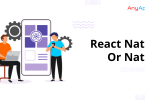Over recent years, the demand for mobile apps has increased dramatically. With that, billions of smartphones and tablets are sold annually. The increasing demand for mobile devices has made businesses realize the importance of having a mobile presence. However, building customized solutions for individual platforms like iOS and Android can become costly and time-consuming.
To overcome this challenge, cross-platform app development tools were introduced. These tools enable coders to develop mobile applications for all major platforms simultaneously. They give high performance, fast delivery speeds, and easy maintenance.
So, what could we expect from the future of cross-platform app development?
Importance of cross-platform app development
Cross-platform app development refers to the process of creating software applications that can run on multiple platforms such as Android, iOS, Windows, macOS, etc. This allows developers to create one version of their application which can work across different devices and operating systems.
Today, business owners are focusing on creating mobile presences for their products and services. This helps them drive up consumer awareness. Cross-platform app development help businesses create software applications that can run on multiple platforms such as Android, iOS, Windows, and macOS. This allows developers to create one version of their application which can work across different devices and operating systems. Let us look deeper into its advantages below.
Cost Savings
Developing multiple apps independently requires a large amount of money. Each OS demands specific code bases, resulting in lots of effort. Whereas, developing a single app that runs on multiple platforms is more cost-effective. Utilizing cross-platform tools allow programmers to develop one application with reusable code snippets for deployment across various platforms. This leads to lower overall costs than a single OS. With cross-platform app development, you only need to invest in coding, testing, debugging, and maintenance once instead of doing so repeatedly for every individual platform version.
Maintenance Made Simple
One common misconception regarding cross-platform development is that the applications lose unique characteristics or fail to address technical issues. Skilled professionals implement efficient development procedures and incorporate native components directly into codebases. The platform-specific modules integrate seamlessly without impacting the end-user experience. Consequently, maintaining consistently functional software becomes simpler when compared to managing standalone elements that are developed separately.
Time Efficiency
Multiple developers require coordination between team members when focusing on different Operating Systems. It results in slower project completion times. Deploying cross-platform solutions permits one developer to manage core functionality. Also, it allows other specialists to focus on platform-specific optimizations. This approach streamlines workflows without interrupting ongoing development progress.
Consistent User Experience: Building an application for multiple environments can look inconsistent and give a bad user experience. However, using a cross-platform framework ensures consistency and allows your app to show similar behavior or appearance on different devices. It makes it easier for end-users to navigate through your product’s functionalities. Consequently, it leads to enhanced customer satisfaction and loyalty towards your brand, encouraging them to use other services provided by your company.
Faster Time-to-Market: Creating and releasing versions for several platforms takes longer than launching a multi-device app. The product reaches customers faster by using a single codebase and building an application that functions effectively on numerous systems. Thus, users receive timely access to new features, updates, and improvements.
Improved Engagement: Users prefer mobile and web apps, which offer intuitive interfaces customized to their device type. When users find consistent layouts or controls across the website or app, users become comfortable interacting with your product. As a result, customer engagement increases drastically.
Several trends that might shape cross-platform app development over the next few years
As businesses thrive to adopt technological innovations, cross-platform app development trends continue to evolve. App developed using cross-platform requires no separate codes. Over the past few years, several trends have emerged in cross-platform app development. These trends are changing the ways software work in the future. By understanding these current trends, organizations can stay competitive. Here is a look at some of the top cross-platform app trends to watch out for in 2023 and beyond.
- Advancements In Augmented Reality and Virtual Reality Support: AR and VR headsets have gained attraction in both consumer markets. These technologies have shown a rise in customer engagement, reduced training costs, and enhanced visual collaboration. Native cross-platform development frameworks for VR and AR interfaces enable digital interactions inside apps.
- Advancements in JavaScript Frameworks: JavaScript frameworks like React Native, AngularDart, Xamarin, and Flutter have become a powerful alternatives to hybrid app development solutions. These frameworks enable fast development cycles and improved code reuse. This results in reduced project delivery times and increased developer productivity. Companies are shifting toward developing hybrid and native apps using JavaScript engines, helping organizations build high-quality, feature-rich apps. These apps operate smoothly across different platforms.
- Cloud Integration and Backend Services: Cloud computing allows cross-platform app development teams to store and manage backend services in centralized locations, accessible from anywhere. Additionally, cloud providers provide scalability options, security configurations, and infrastructure redundancy, reducing operational overheads. Companies can thus focus on creating attractive UIs and front-end functionality while leveraging robust backends.
- Growth in Hybrid and Progressive Web Applications: With hybrid and progressive web applications becoming popular, it is no surprise that most developers opt for these solutions when building multi-platform mobile applications. This shift presents advantages related to cost optimization, simplified maintenance, faster development, and a wider audience reach.
- The emergence of Voice Interactions and Artificial Intelligence (AI) Integration: With virtual assistants and voice-based interactions, businesses need to adapt by incorporating AI-based features into their apps. AI and machine learning are becoming the central component of cross-platform app development. Furthermore, integrating machine learning algorithms and advanced AI functionalities enables contextual recommendations and customizable interfaces.
- Focus on Security and Data Privacy: There are many security issues that businesses count. These issues include sensitive information protection that requires businesses to actively address security vulnerabilities. Cross-platform offers robust security measures. Both developers and decision-makers should concentrate on encryption methods, secure authentication protocols, access controls, regular vulnerability testing, and monitoring intrusion attempts.
Top Cross-platform Frameworks
The world of cross-platform application development has exploded in recent years. Various frameworks offer businesses numerous choices to build high-quality and feature-rich mobile apps.
In today’s rapidly changing environment, several frameworks have established themselves as leaders in the field based on various factors. This includes ease of use, community support, flexibility, and versatility.
- React Native: One of the most popular frameworks currently available in React Native. It simplifies cross-platform app development with its JavaScript foundation. The component of React Native makes it easy to reuse code across multiple platforms. React Native allows developers to design responsive, native-like User Interface components with fewer resources compared to other tools.
- Flutter: Flutter, developed by Google, aims to provide exceptional UI performance on Android and iOS devices while remaining highly flexible. It relies on Dart programming language and utilizes Skia GPU-accelerated graphics library. Flutter develops beautiful, natively performing applications. It offers a hot reload, streamlined debugging, and fast iteration cycles for maximum efficiency during development.
- Xamarin: Xamarin lets developers reuse up to 96% of shared codebase across diverse platforms without any complexity. Being part of the Microsoft ecosystem, it offers easy integration with Azure, Office 365, Dynamics CRM, Power BI, SharePoint, Exchange Online, Teams, Outlook, Yammer Enterprise, etc.
- PhoneGap: It builds hybrid apps and relies on open-source plugins for extended native functionality. It allows businesses and programmers to develop web applications using HTML, CSS, and JavaScript. PhoneGap wraps the website inside a container to run natively under the target environment.
- Unity3D: Unity3D is one of the most popular cross-platform app development frameworks in the market. Although primarily Unity3D was used for creating games, now it is used in other areas, including augmented reality or virtual reality experiences, mobile applications, and more.
Conclusion:
Cross-platform development toolkits are rapidly advancing and offer great faster delivery times. These platforms reduce maintenance overhead, offer reliability with native compilers, and support new technologies. Companies worldwide invest a lot in developing mobile applications to reach customers wherever they live.
So, if you are looking to develop apps using the cross-platform framework, we are here to help.
We at Anyappmaker have a team of expert developers who have helped many businesses develop the highly-effective apps. Contact today.







